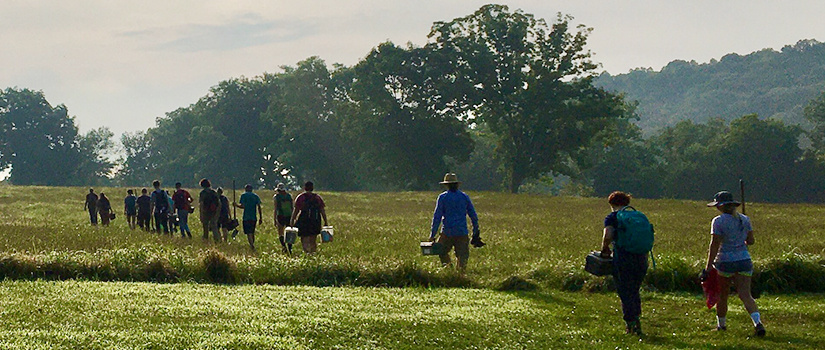Find the Right Degree
Our department offers both the Master of Arts and Doctor of Philosophy degrees, as well as several interdisciplinary certificate programs.
There are two tracks within the Master of Arts program: a standard M.A., offering specialization in one of the four fields, and a professional track M.A. , focused on Public Archaeology [pdf]. Additionally, standard Master of Arts students can apply for either a terminal M.A. or may complete the M.A. on the way to earning the Ph.D.
Students who have been accepted into the Ph.D. program will enroll concurrently in the M.A. and Ph.D. programs unless they already have an M.A. in Anthropology.
Apply for an assistantship
Many of our students pursue a graduate assistantship after they are accepted into the graduate program in order to earn money while they conduct their research.
What You'll Study
You'll choose a sub-field of anthropology to specialize in, but we encourage you to cross the boundaries of each sub-field and incorporate them into your graduate work.
Four Sub-fields of Anthropology
Our archaeology faculty focus on a range of research areas including:
- Applied archaeology documenting deep histories of Maya ecological knowledge and agriculture (Fisher)
- Historical archaeology of African diaspora slavery and self-liberation (Weik)
- Indigenous struggles against settler-colonialism in the Caribbean and U.S. (Weik)
- Historical archaeology of the 19th century rural landscapes (Weik)
- African prehistoric archaeology and ethnoarchaeology (Casey)
- Historical archaeology of the African diaspora in the U.S. and West Africa (Goldberg)
- Ethnoarchaeology in West Africa (Goldberg)
- Public heritage and memorialization in both the eastern U.S. and West Africa (Goldberg)
- The South Carolina Institute of Archaeology and Anthropology (SCIAA) also has several archaeologists working on prehistoric (King) and historic archaeology (DePratter) of the Southeast and a very large collection of materials from the state.
Many of our archaeology faculty offer elective courses that complement other subfield offerings.
Our biological anthropology faculty are primarily interested in bioarchaeological approaches to reconstruction demography, health and disease in past populations in ways that are relevant to living people. Their work addresses questions about how health and disease outcomes in the past were shaped by various factors such as age, gender, social race, socio-economic status, immigrant status and environmental conditions. Their research is informed by theoretical perspectives on embodiment (ecosocial theory), developmental origins of health and disease (DOHaD), intersectionality and the social determinants of health.
Dr. de la Cova integrates historical archival research with paleopathological analysis.
Dr. Jankovic-Rankovic combines measurements of social and cultural contexts gleaned through ethnographic research with physical and mental health data and physiological information obtained from a collection of biomarkers.
Our cultural anthropology faculty study social discourses in a wide range of contexts, including:
- Political-economic change and migration in Guatemala, Mexico and the U.S. (Reynolds)
- How undocumented migrants navigate shifting immigration enforcement trends in the U.S., Central America, and Mexico (Doering-White)
- Intersection between gender and popular culture in China and Taiwan (Moskowitz)
- Women's organizations, Afro-Dominicanness and African American culture and experience in the Dominican Republic and the U.S. (K. Simmons)
- Race, inequality and environmental inequality in the U.S. south (Barra)
- How power shapes vernacular and biomedical meanings of health, healing and therapeutic practice (D. Simmons)
- Socio-cultural legacies of the Soviet atomic bomb project and the political economy of health in Kazakhstan (Stawkowski)
Our Linguistic Anthropology faculty have complementary research strengths in interactionist, performative and semiotic approaches to the intra- and intersubjective mediation of subject formation as it pertains to forms of social belonging and exclusion.
Dr. Reynolds is a specialist in language socialization and studies quotidian discourse practices within family networks, peer groups, and schools within contexts of political and economic change and internal and transnational migration. Linguistic anthropology is also one of the subfield areas of concentration within the Linguistics Program.
